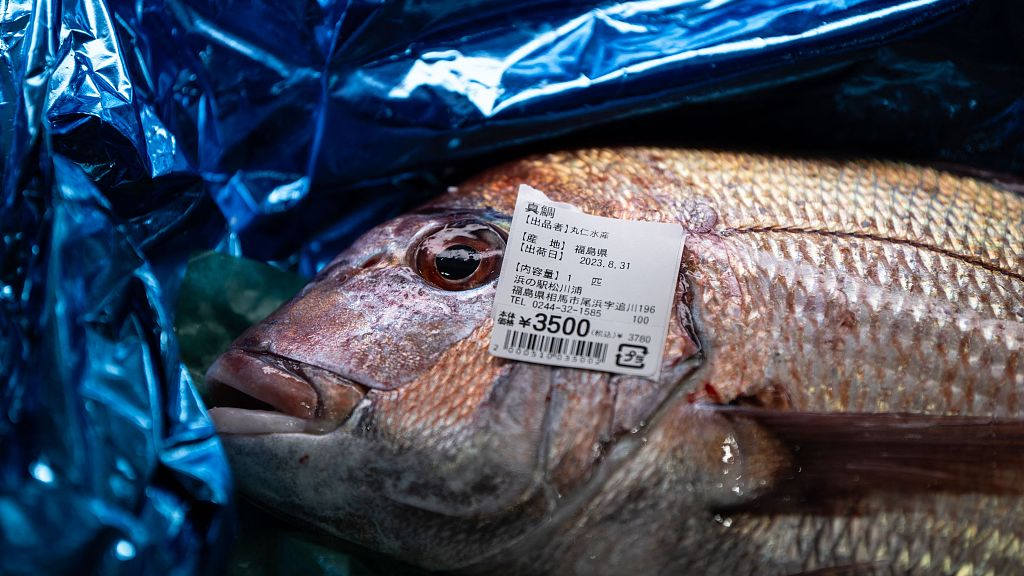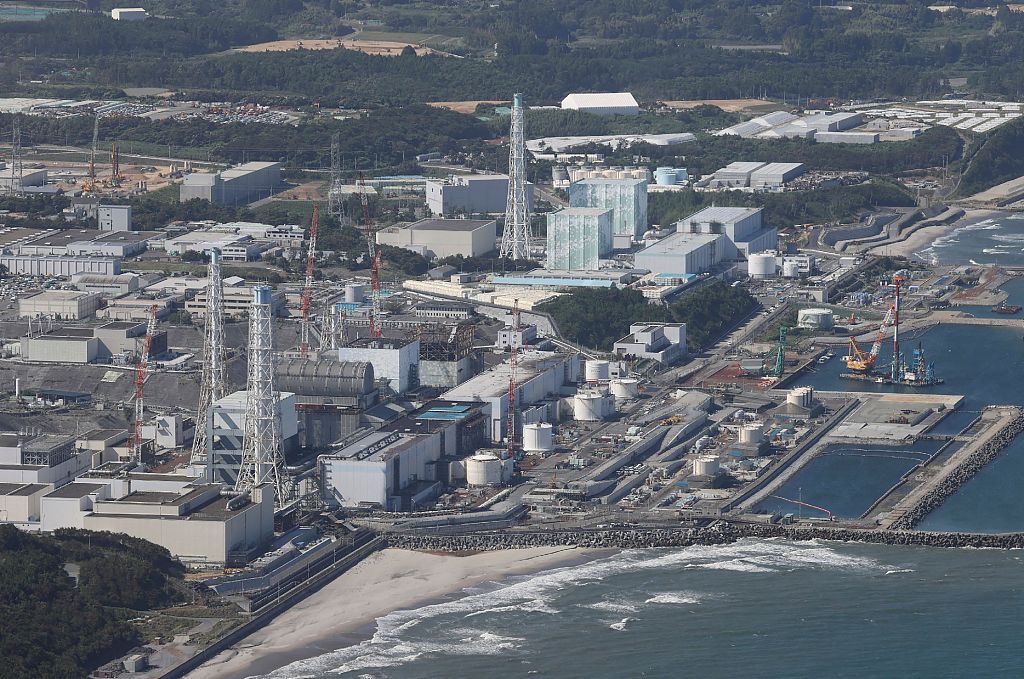
Seafood from Fukushima Prefecture is seen at Hamanoeki Fish Market and Food Court in Soma City of Fukushima Prefecture, Japan, August 31, 2023. /CFP
Seafood from Fukushima Prefecture is seen at Hamanoeki Fish Market and Food Court in Soma City of Fukushima Prefecture, Japan, August 31, 2023. /CFP
Editor's note: Azhar Azam, a special commentator on current affairs for CGTN, works in a private organization as a "market and business analyst" and writes on geopolitical issues and regional conflicts. The article reflects the author's opinions, and not necessarily the views of CGTN.
A Japanese civic group has filed a complaint against the country's Prime Minister Fumio Kishida and Tokyo Electric Power Company (TEPCO) President Tomoaki Kobayakawa to the Tokyo District Prosecutor's Office over discharge of potentially contaminated water from the Fukushima Daiichi Nuclear Power Plant into the sea, reported the Kyodo News.
The complaint stated that although the nuclear contaminated water was purified using the Advanced Liquid Processing System, radioactive substances other than tritium – which are considered to be irremovable – still remained. This allegation of serious negligence redraws focus on Japan's irresponsible conduct and the need to protect the health of the people consuming aquatic products.
Lately, experts have discovered an inconsistency between the reality and the TEPCO's assurances, which were "not supported by the quantity and quality of the data," said Ken Buesseler, an oceanographer of the Woods Hole Oceanographic Institution. The water that will be discharged for decades has "real implications for ocean life and the human lives," according to Robert Richmond, a marine biologist at the University of Hawaii, Manoa.
Back in 2021, the UN's human rights experts had expressed deep regret on the decision, warning that it could impact millions across the Pacific region. Describing it as "very concerning," they cautioned the release of "contaminated water into the marine environment imposes considerable risks to the full enjoyment of human rights of concerned populations in and beyond the borders of Japan."
Questions also lingered about transparency of the water discharge as experts said the Japanese data shouldn't be taken at face value, and Pacific Islands and neighboring countries raised shared concern. However, the Group of Seven countries seemed to agree with the plan, given that they welcomed "steady progress of decommissioning work" at the plant and Japan's "transparent efforts" based on scientific evidence, according to their communique issued in May. The UN nuclear watchdog, International Atomic Energy Agency, also stated Japan's approach and activities were "consistent with" relevant global safety standards.

An aerial picture of the Tokyo Electric Power Company's crippled Fukushima Daiichi Nuclear Power Plant in Okuma, Fukushima Prefecture, Japan, August 24, 2023. /CFP
An aerial picture of the Tokyo Electric Power Company's crippled Fukushima Daiichi Nuclear Power Plant in Okuma, Fukushima Prefecture, Japan, August 24, 2023. /CFP
Notwithstanding the criticism at home and abroad, Japan brushed aside grim concerns about dangerous environmental impacts and human rights and began dumping water into the sea. This deliberate act to pollute the Pacific Ocean, based on limited and flawed scientific assessment, is unacceptable and faces a strong denunciation.
In neighboring South Korea, a large gathering of reportedly more than 50,000 citizens protested against Tokyo's decision and urged their government to intervene to prevent the looming disaster from the Japanese release of 1.3 million metric tons of contaminated radioactive water, enough to fill 500 Olympic-sized swimming pools.
The opposition parties in the country showed solidarity with the civic groups and slammed Tokyo over the controversial release, calling it "environmental terrorism" as mothers of young children criticized Tokyo for "passing the responsibility to future generations." "Japan has ultimately chosen the path of an environmental war criminal," said Democratic Party leader Lee Jae-myung in a party meeting.
Han Duck-soo, the South Korean Prime Minister, in a public statement published in August, had also sought the Japanese government to "disclose information transparently and responsibly." A public poll in South Korea, showing seven in 10 South Koreans were opposed to releasing the radioactive water, highlighted the growing unrest within the region.
One of the major issues is the extraction of 880 tons of melted fuel debris, contained in three of the reactors. The International Institute for Nuclear Decommissioning Research estimates that reactor No. 1 has accumulated 279 tons of such debris. A study in March confirmed the melted nuclear fuel had broken through a pressure vessel and damaged a concrete pedestal heavily, stoking concerns that an earthquake could knock down the structure.
Dumping of nuclear-contaminated water clearly disregards the scientific evidence and violates the human rights of the people and communities in Japan and the wider Asia-Pacific region that have the right to live in a clean, healthy, and sustainable environment.
The "deliberate pollution" of the marine environment infuriated Greenpeace Japan, which called the act an "outrage" and expressed deep disappointment on the Japanese government's announcement to release the contaminated water into the ocean, snubbing "concerns" of the fishermen, Fukushima residents and the international community, especially in the Pacific region.
A large proportion of the Japanese also oppose their government's plan and are reluctant to accept the TEPCO's assurances for the company in 2018 admitted that the contaminated water contained radioactive compounds after asserting they had been filtered out. This spells out that Japan's irresponsible act is a threat to the environment and the Japanese people, which is being reflected in their legal proceedings against Kishida and Kobayakawa.
(If you want to contribute and have specific expertise, please contact us at opinions@cgtn.com. Follow @thouse_opinions on Twitter to discover the latest commentaries in the CGTN Opinion Section.)